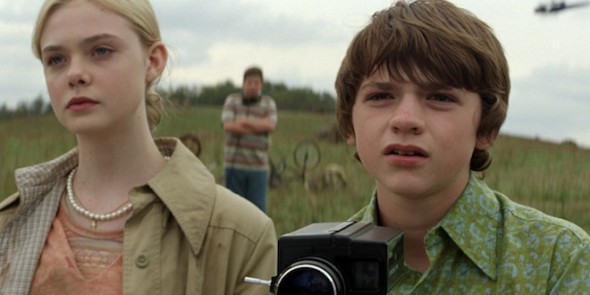interview with j.j abrams – the writer/director of super 8
Produced by Steven Spielberg and written/directed by J.J Abrams, Super 8 is set in the summer of 1979, and follows a group of young friends who witness a train derailing while they’re shooting a short film on Super 8. After this horrific incident, a series of strange events begin to occur and various locals go missing. While this is a big-budget blockbuster with impressive special effects, when I spoke to J.J Abrams, he wanted to ensure that audiences were aware of the importance he placed on character development, and the themes of friendship, love and nostalgia for the past.
After working on diverse films such as Regarding Henry, Cloverfield, Morning Glory, and popular television shows such as Lost (which he co-created), Alias and Felicity, Abrams embraced his role as the director on Super 8. “The great thing about directing is that you get to set the shots and the tone of the scenes, and work with the actors to (hopefully) bring out the best in them.” But he also enjoys the surprises that the role can bring. “You just don’t know what you’re going to get – with the lighting, with what the actors are going to bring to the characters… I’ve thrown away ideas completely and started over, and tried to force something into the moment until I finally realise it’s not going to work – so it’s always different. It’s a social situation, it’s fun. It’s far less lonely then sitting alone working on a script” he explains.
Abrams always planned to set the film in the 1970s, and didn’t experience any troubles when he asked Steven Spielberg to come on board. “My first impulse for this was to revisit that period, to kind of go back to that time, when my friends and I made these movies” Abrams explains. “I called Stephen who I had gotten to know over the years, and I asked if he would be interested in producing a movie called Super 8. This was before I knew what the story would be, or even what the genre would be – it was just a very preliminary notion. And he said yes”.
One of the benefits of setting the film in that period was that Abrams didn’t need to worry about new technological devices being used by the characters, since “the cell phone is the death of drama” Abrams laughs. “The instant information, the lack of secrecy, the ability to know whatever you want to know – the ‘process’ has gone away. The great thing about this is that if the kids wanted to communicate, they would have to get on their bike, or use walkie talkies” he says.
And while Abrams can appreciate the breakthroughs in technology when it comes to filmmaking today, he notes that he still has a soft spot for the ways of the past. “Now we don’t have to think about how much film we have, how much it costs, how long it takes to get developed. When you were editing back then, the undo button didn’t exist. But now there’s a kind of frivolousness to the choices that we make. And even though you were limited in so many ways, there was something about the aesthetic and the tactile, and the nature of it all. This has now also become true to life in general – you click a button that’s not a button, you’re giving money that you’re not even holding, you get the song that you don’t actually get to hold in your hand…. Being on this film, it’s one of the things I do miss.”
Aside from the setting, one of the most important aspects of the film is the characters. “It had to be real from the inside out. From a character point of view – that was more important for me then selling the monster. If you believe that these kids are real people, if you’re interested in their relationships, if you’re amused by them, and care for them, then everything else would work out. That was the only thing that I was desperate to focus on” he admits.
Abrams was able to learn some techniques when it came to directing children from Spielberg, who has vast experience in this realm. “He gave me some great advice” Abrams says. “He said that with kids, you can give them line readings, which I never would have considered doing”. Even though most of the children had little to no experience on a film set before, Abrams says, “the truth is they were just terrific from the beginning. The difference really between dealing with kids and dealing with adults, is marginal. Maybe the biggest thing is that you don’t usually have to wrangle a bunch of actors” he laughs.
Elle Fanning who recently starred in Sophia Coppola’s Somewhere, particularly impressed Abrams with her professionalism. “She has a high level of sophistication and understanding. She is a star on an ordinate magnitude that I haven’t seen in a long time”. He notes that overall, “the kids were really hard working and were dedicated to doing a good job. So for the most part, it was about letting that dynamic exist in the movie – I didn’t want to become an iron-fisted director, I wanted that dynamic”.
While the film does become a bit clichéd toward the end, the young cast were very convincing and the film manages to successfully explore various meaningful themes. “There are scary elements, but it’s hardly a horror movie. I feel like it’s a combination of so many genres” Abrams says.
Super 8 is in cinemas from June 9.



Pingback: INTERVIEW WITH J.J ABRAMS For ‘SUPER 8.’ | DamnGoodCup.com